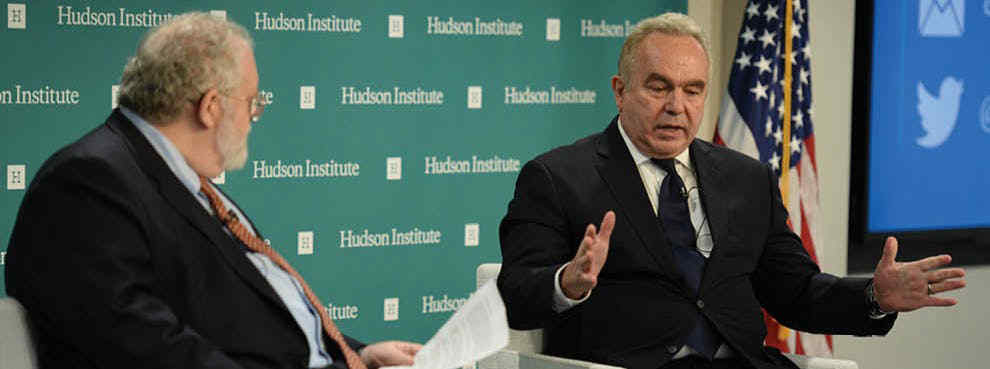


Kurt Michael Campbell, former Assistant Secretary of State for East Asian and Pacific Affairs, noted that places like nursing homes will be at enormous risk in the period ahead, and a fundamental slowdown in the global economy will possibly take place in the next several months.(Photo :Hudson Institute official website)
As the number of people dead and infected from COVID-19 sees a significant rise across the US, uncertainties among both officials and the public continue to grow over whether the US has already missed its best window of opportunity to curb the spread of the lethal virus, or even if the government is fully prepared for even more severe consequences.
During a news briefing held on March 9, WHO Director General Tedros Ghebreyesus reiterated that in areas with community spread, “testing every suspected case and tracing their contacts becomes more challenging, while actions must be taken to prevent transmission at the community level to reduce the epidemic to manageable clusters.”
But the US’ current response to the virus seems to go directly against WHO advice. On March 9, the Seattle-area nursing home at the epicenter of the US COVID-19 outbreak said it had no kits to test 65 employees who were showing symptoms of the virus that has killed at least 13 patients at the long-term care center.
According to Reuters, 26 of the nursing home’s 120 patients have died since Feb. 19, with 13 of the 15 autopsies carried out so far showing that COVID-19 was the cause, while 21 of the center’s residents have tested positive for the virus. Though University of Washington has already offered to process tests, it is still unclear why the nursing staff have yet to receive kits.
This slow response has irritated the public, with Tim Killan, Life Care Center spokesman, telling Reuters that he did not know why the kits had not been forthcoming despite the fact they have been asking various government agencies to supply them with test kits.
The world is not struggling against an unknown virus. China identified it in a short period of time after the outbreak and shared its genetic sequence with other countries. It is hard to believe that a superpower like the US has a shortage of test kits and is not able to test enough people for the coronavirus, causing a public outcry.
According to a Times report on March 9, an annual intelligence report that has been postponed without explanation by the White House warns that the US remains unprepared for a global pandemic, while experts stressed that preventing the public airing of such threats leaves the public ignorant of the dangers they face and unable to assess the performance of their elected officials.
The US government’s stuttering epidemic control measures and attempts to mask the problem with empty shows of confidence have also led to a financial market crash on March 9, with volatility increasing and major indices like the Dow Jones dropping over 7 percent, triggering a rare trading halt.
Such negative outcomes were already anticipated by many American political leaders. During an interview with the Hudson Institute on March 3, Kurt Michael Campbell, former Assistant Secretary of State for East Asian and Pacific Affairs, noted that places like nursing homes will be at enormous risk in the period ahead, and a fundamental slowdown in the global economy will possibly take place in the next several months.
“We were given some time by the unbelievably draconian steps that the Chinese have taken. I’m not sure we used that time effectively,” said Campbell.
 Fire brigade in Shanghai holds group wedding
Fire brigade in Shanghai holds group wedding Tourists enjoy ice sculptures in Datan Town, north China
Tourists enjoy ice sculptures in Datan Town, north China Sunset scenery of Dayan Pagoda in Xi'an
Sunset scenery of Dayan Pagoda in Xi'an Tourists have fun at scenic spot in Nanlong Town, NW China
Tourists have fun at scenic spot in Nanlong Town, NW China Harbin attracts tourists by making best use of ice in winter
Harbin attracts tourists by making best use of ice in winter In pics: FIS Alpine Ski Women's World Cup Slalom
In pics: FIS Alpine Ski Women's World Cup Slalom Black-necked cranes rest at reservoir in Lhunzhub County, Lhasa
Black-necked cranes rest at reservoir in Lhunzhub County, Lhasa China's FAST telescope will be available to foreign scientists in April
China's FAST telescope will be available to foreign scientists in April "She power" plays indispensable role in poverty alleviation
"She power" plays indispensable role in poverty alleviation Top 10 world news events of People's Daily in 2020
Top 10 world news events of People's Daily in 2020 Top 10 China news events of People's Daily in 2020
Top 10 China news events of People's Daily in 2020 Top 10 media buzzwords of 2020
Top 10 media buzzwords of 2020 Year-ender:10 major tourism stories of 2020
Year-ender:10 major tourism stories of 2020 No interference in Venezuelan issues
No interference in Venezuelan issues
 Biz prepares for trade spat
Biz prepares for trade spat
 Broadcasting Continent
Broadcasting Continent Australia wins Chinese CEOs as US loses
Australia wins Chinese CEOs as US loses